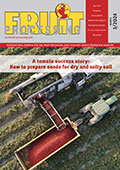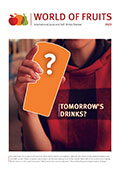Elopak is rolling out a new filling machine with exceptional hygiene levels that gives fresh products a shelf life of up to 60 days. This machine is supported by a HEPA air management system, which is the result of extensive research and testing.
The next-generation filling machine is designed by Elopak and produced by the company’s long-term partner Shikoku. The HEPA filter system, stainless steel components and dual-step heating and sealing processes ensure the highest levels of hygiene, helping to extend the shelf-life of fresh products.
The machine’s self-cleaning and sterilisation features allow efficient switches between products, reducing food waste. The machine is versatile and fills gable top cartons from 250 ml up to 1.136 ml in Pure-Pak® carton formats.
In addition to improving hygiene standards, the machine has an upgraded safety design for operators. Hands-free cleaning and magnetic doors further ensure the operator’s safety and reduce the margin for human error.
The machine is designed to fill cartons with fresh and extended shelf-life dairy products, fresh and extended shelf-life juices, water, and plant-based drinks. All products with or without particles.
Patrick Verhelst, Elopak’s Chief Marketing Officer said: “Our new filling machine is manufactured to meet the highest quality and hygiene standards. It sets a new standard for fresh products by extending the shelf life to 60 days. A longer shelf life means less food waste in addition to making it easier for the consumer to choose environmentally friendly containers for their fresh milk or juice products.”
‘No added sugar’ claims are growing in Europe, with the UK leading the charge as it has the highest proportion (15 %) of European food and drink launches carrying this claim in the past five years, followed by Germany (13 %) and France (10 %). In Poland, ‘no added sugar’ claims have doubled since 2016, reaching 9 % of food and drink launches in 2021.
According to Mintel’s latest consumer research, almost three out of five (59 %) French and German consumers are trying to limit their sugar intake, rising to 65 % of respondents in Poland and 67 % in Spain. However, over half of German (54 %) and (53 %) French* consumers simply prefer eating less indulgent products instead of consuming more ‘light/diet’ alternatives. This is especially true for carbonated soft drinks, with Polish (38 %)** and German (37 %)** consumers being the most likely to agree that ‘better-for-you’ carbonated soft drinks do not feel like a treat.
Neha Srivastava, Food and Drink Patent Analyst at Mintel, said:
“The pandemic has amplified the need for indulgence, influencing consumers’ choice of food and drink. At the same time, the pandemic has seen people place a higher priority on their health by, for example, reducing their sugar intake – but they don’t want to compromise on taste.
“Food and drink companies are starting to pay more attention to cutting sugar from their products. Based on the percentage of granted patents currently active in Europe, France and Germany are among the top five leading countries with the majority of patent grants related to sugar reduction, each accounting for 5 % of all global patent grants. Recent patent activity related to sugar reduction varies from improving the taste of sweeteners to innovating new techniques to reduce the production cost of rare sugars.”
Functional fibre and next-gen stevia could appeal as natural alternatives
Functional fibres in low/reduced sugar food and drink launches are on the rise, increasing globally from 11 % in 2015 to 19 % in 2020. Inulin is the most common functional fibre in low/reduced sugar products, with product launches containing inulin having tripled in the past five years, rising to 9 % in 2020 from 3 % in 2015.
With 63 %*** of Germans concerned about how sugar reduction in food and drink is achieved, combining fibres with sugar to reduce overall sugar content could be an option worth exploring as an alternative. This could also appeal to the 29 %**** of Brits that are interested in more fruit juices, juice drinks and smoothies with high fibre content.
Alternatively, stevia as a plant-based sweetener has the potential to appeal to European consumers as a sugar substitute. In fact, 63 %*** of Germans have no concerns about the amount of plant-based sweeteners (such as stevia) used in food and drink.
Neha Srivastava, Food and Drink Patent Analyst at Mintel, said:
“Consumers are aware of the importance of fibres in maintaining gut health. Brands can leverage this awareness by repositioning them as a multifunctional health ingredient that helps reduce sugar content in food and drink whilst improving gut health.
“Stevia continues to gain traction in food and drink launches because of its naturalness and zero calorific value, but its bitter and lingering aftertaste remains a significant barrier. Recent patent innovations to improve taste issues and physicochemical properties, like purity and solubility, to produce next-generation stevia may help overcome the challenge.
“Innovators are looking for alternative approaches, such as the use of sweet flavouring agents and aromas as a promising option to reduce sugar content in new food and drink products – especially in dairy desserts. This can be a promising option to reduce sugar content by providing sweet perception in brain cells.”
*987 internet users aged 16+ who try to eat/drink healthily, France; 1,955 internet users aged 16+ who try to eat/drink healthily, Germany; 997 internet users aged 16+ who try to eat/drink healthily, Spain; 988 internet users aged 16+ who try to eat/drink healthily, Poland; March 2021
**1,000 internet users aged 16+ in Poland and 2,000 internet users aged 16+ in Germany, December 2020
***2,000 internet users aged 16+, Germany, June 2020
****2,000 internet users aged 16+, UK, October 2020
*****1,000 internet users aged 16+, Italy and Spain, September 2020









